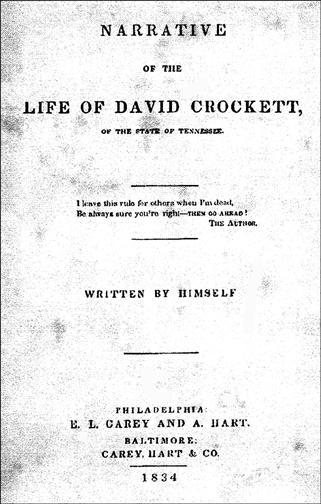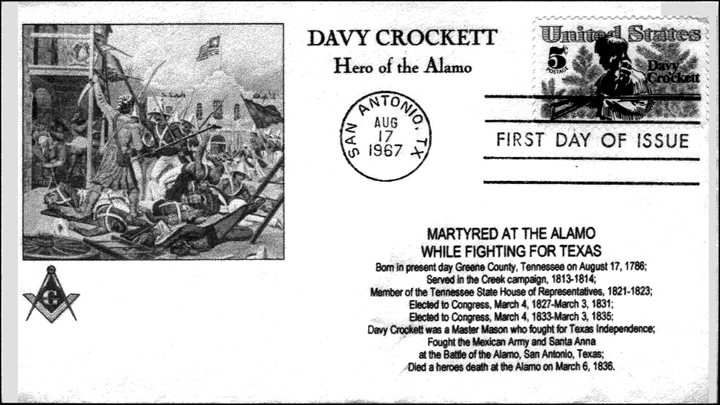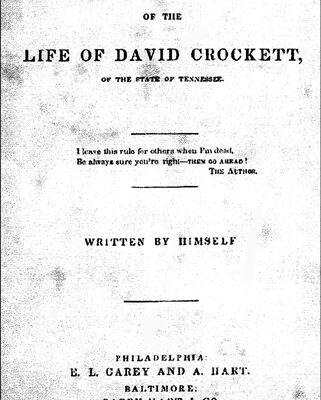People living in the 1950s readily recall the action-packed Walt Disney movies pertaining to the life of legendary hero, Davy Crockett. Many, like this writer, had to have a coonskin cap to wear that was available from such downtown establishments as S.H. Kress, McLellan’s, Woolworth’s, Charles Store and Powell’s.
Disney broadcast the action-packed episodes to those who were fortunate to own black and white television sets. Today, they are equally exciting to watch in DVD and Blu-ray formats.
The hit song from the series made popular by Bill Hayes, Fess Parker and Tennessee Ernie Ford, while very entertaining, was not completely accurate. It had the pioneer being born on a mountaintop (instead of the banks of the Nolichucky River), living in the greenest state in the land of the free (absolutely correct), raised in the woods where he knew every tree (certainly) and killed him a bear when he was only three (highly improbable even for Davy).

The colorful pioneer penned his autobiography, which he titled, Narrative of the Life of David Crockett, of the State of Tennessee (Carey and Hart Co., 1834). The work provides a realistic and often humorous perspective on the hardy backwoodsman and later politician.
The preface was captivating because Davy talks directly to his readers and reveals what makes him tick. Reading this section prepares readers for what to expect in the remainder of the book. Crockett began by saying, “Fashion is a thing I care mighty little about, except when it happens to run just exactly according to my own notion and I was mighty nigh sending out my book without any preface at all, until a notion struck me, that perhaps it was necessary to explain a little the reason why and wherefore I had written it.”
Crockett was quick to state his motive for the autobiography; instead of fame, he sought justice. It seems that a nameless author had penned a biography of him and Davy was not happy with it: “(He) has done me much injustice and the catchpenny errors, which it contains, have been already too long sanctioned by my silence. I don't know the author of the book and indeed I don't want to know him; for after he has taken such a liberty with my name, and made such an effort to hold me up to public ridicule, he cannot calculate on any thing but my displeasure.” Other comments of the famous Tennessean can best be stated in his words:
“I have met with hundreds, if not with thousands of people, who have formed their opinions of my appearance, habits, language, and every thing else from that deceptive work. They have almost in every instance expressed the most profound astonishment at finding me in human shape and with the countenance appearance and common feelings of a human being.
“In the following pages I have endeavored to give the reader a plain, honest, homespun account of my state in life and some few of the difficulties, which have attended me along its journey down to this time. I am perfectly aware that I have related many small and, as I fear, uninteresting circumstances, but if so, my apology is that it was rendered necessary by a desire to link the different periods of my life together, as they have passed, from my child-hood onward, and thereby to enable the reader to select such parts of it as he may relish most, if indeed there is any thing in it which may suit his palate.
“I have also been operated on by another consideration. It is this: I know, that obscure as I am, my name is making considerable deal of fuss in the world. I can't tell why it is, nor in what it is to end. Go where I will, everybody seems anxious to get a peep at me.
“They will, at most, have only their trouble for their pay. But I rather expect I shall have them on my side. But I don't know of any thing in my book to be criticized on by honorable men. Is it on my spelling ? — that's not my trade. Is it on my grammar? — I hadn't time to learn it, and make no pretensions to it. Is it on the order and arrangement of my book? — I never wrote one before, and never read very many; and, of course, know mighty little about that.
“Will it be on the authorship of the book? — this I claim, and I'1l hang on to it, like a wax plaster. The whole book is my own and every sentiment and sentence in it. I would not be such a fool, or knave either, as to deny that I have had it hastily run over by a friend or so, and that some little alterations have been made in the spelling and grammar; and I am not so sure that it is not the worse of even that, for I despise this way of spelling contrary to nature. And as for grammar, it's pretty much a thing of nothing at last, after all the fuss that's made about it. In some places, I wouldn't suffer either the spelling, or grammar, or any thing else to be touch'd; and therefore it will be found in my own way.”

Crockett’s preface concluded by saying, “But just read for yourself, and my ears for a heel tap, if before you get through you don't say, with many a good-natured smile and hearty laugh. This is truly the very thing itself — the exact image of its author, David Crockett, Washington City, February 1st, 1834.”
If Davy could correct the hit song about him in the mid 1950s, perhaps it would read: “Born on the banks of the Nolichucky River; Greenest state full of groundhogs and beaver; Raised in the woods so’s he knew every tree; Killed him a bear when he was over three; Davy, Davy Crockett; King of the Wild Frontier.”

Comments are closed.